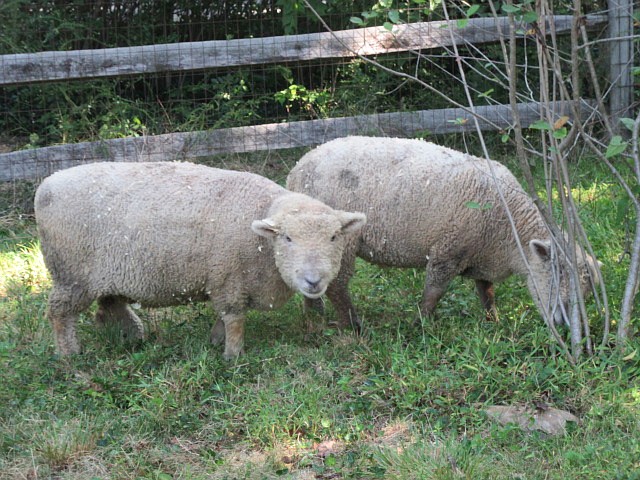Seventeen woolly lambs and sheep scampered out the back of the trailer, down a ramp, onto the front yard and immediately started chomping voraciously on grass, violets and other vegetation at Tony Bates’s and Mary Thompson’s house on a sunny, Sept. 21 morning.
They were the Lamb Mowers, a 17-head flock of heirloom, Babydoll Southdown sheep, owned by Cory Suter who founded the Fairfax County company in 2020. He takes his flock all over Northern Virginia to “mow lawns” and while at it, Suter yanks out homeowners’ invasive plants, like Japanese stiltgrass and porcelain berry vines. His flock has grazed on over 100 Northern Virginia yards so far. The number of sheep he takes to each job depends on the nature and size of the property.
“I hate mowing,” said Bates, as he watched his very focused “guests” munch about quietly. “Mowers use energy. These sheep leave free fertilizer and they are the quietest mowing service available.” This was the Lamb Mowers’ second visit to the Bates-Thompson, Mount Vernon-area yard, the first being in May this year.
English colonists brought the Babydoll Southdown breed to North America, said Suter. These sheep are gentle herd animals, ruminants that eat vegetation and then chew their cud, part of a multi-stage digestion process. After about two hours of grazing, their stomachs are usually full, the food works its way back up to the sheep’s throat, they chew it again and then re-swallow it, Suter explained.
Sheep especially like fresh, sweet grass and while many customers and Suter are glad when the sheep chomp on invasive plants, he tries to prevent them from eating invasive English ivy because it could be harmful to their livers. He puts up temporary, plastic, fence netting to keep the sheep out of some areas and protect wanted plants.
Suter’s lambs and sheep are ages five months to seven years. His two sons, six and ten years old, gave the sheep names, like Elf, Sunny, Clover and Monster Truck. Cinnamon, age seven, who weighs over 130 pounds, is the matriarch. Sheep can live to be six to eleven years old, Suter says, which is equivalent to a 70-year-old human. For breeding, Suter has one, err, rambunctious ram, that he does not take to customers’ yards. All of his other rams are wethers, castrated male sheep.
If they resist getting into the trailer, “I never force them to come,” he comments.
Suter schedules two-hour grazing sessions and charges $175 on weekdays and $275 on weekends. After about 90 minutes, most of the sheep retreat to the shade to chew their cuds.
Under county regulations, for properties over two acres, the sheep can stay overnight, a “sheepover,” Suter quipped. Every May he shears the flock, gives away the wool and offers customers “three bags full,” he jokes, referring to the classic children’s nursery rhyme, “Baa, Baa, Black Sheep.”
Before raising lawn-eating sheep, Suter had a green roofing company called Bioneighbors in Philadelphia. He grew up in Virginia’s Rockingham County, attended James Madison University and has a master’s degree in economics.
Today, he’s gladly “the sheepman,” a moniker coined by Providence District Supervisor Dalia Palchik.
For more information, visit www.LambMowers.com.